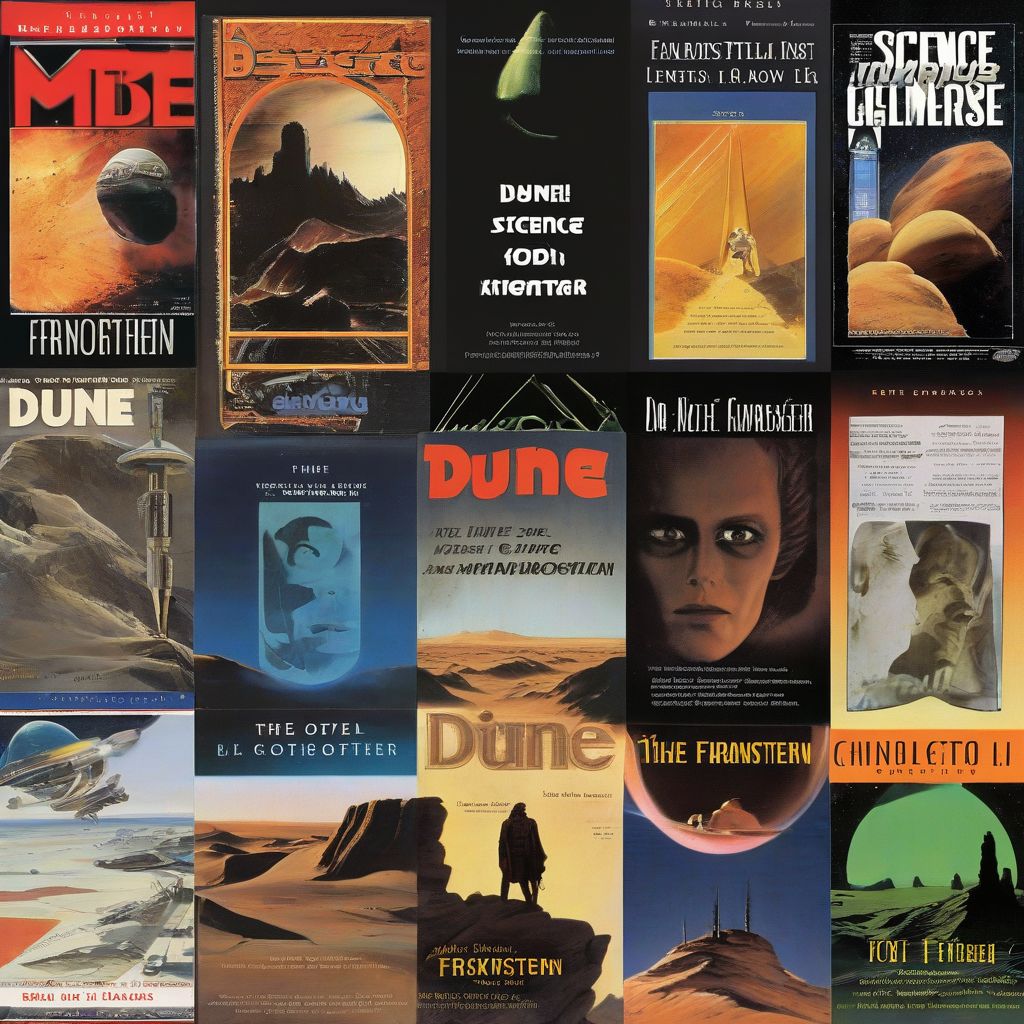Imagine a world where technology has reshaped society, where humans have ventured beyond the stars, and where the very fabric of reality is questioned. This is the captivating realm of science fiction, a genre that has captivated readers for generations with its boundless imagination and thought-provoking themes.
But with countless books exploring alien encounters, dystopian futures, and mind-bending concepts, where do you even begin? This comprehensive guide dives deep into the most influential science fiction books of all time, offering insightful reviews and exploring their lasting impact on literature and culture.
A Journey Through Time and Imagination: Uncovering the Classics
Science fiction, at its core, is a reflection of our hopes and fears, our dreams and anxieties. It allows us to explore the unknown, grapple with ethical dilemmas, and imagine the infinite possibilities that lie ahead.
From the groundbreaking works of Mary Shelley and H.G. Wells to the visionary masterpieces of Isaac Asimov and Ursula K. Le Guin, these authors have shaped our understanding of science fiction and its power to inspire, challenge, and entertain.
1. Frankenstein by Mary Shelley (1818): The Birth of a Genre
Often considered the first true science fiction novel, “Frankenstein” tells the cautionary tale of Victor Frankenstein, a brilliant but reckless scientist who creates a grotesque yet sentient creature in a daring experiment. Shelley’s masterpiece explores the ethical implications of scientific advancement, the nature of humanity, and the consequences of unchecked ambition.
2. The Time Machine by H.G. Wells (1895): A Glimpse into the Future
H.G. Wells, a master of speculative fiction, takes readers on an unforgettable journey through time in “The Time Machine.” This groundbreaking novel introduced the concept of time travel as we know it, exploring the potential consequences of scientific progress and the cyclical nature of history.
3. Nineteen Eighty-Four by George Orwell (1949): A Chilling Dystopia
Orwell’s chilling masterpiece paints a bleak picture of a totalitarian state where Big Brother watches your every move. “Nineteen Eighty-Four” serves as a stark warning against the dangers of totalitarianism, surveillance, and the suppression of individual freedom.
4. Fahrenheit 451 by Ray Bradbury (1953): A Burning Warning
In a future where books are outlawed and firemen burn any they find, Ray Bradbury’s “Fahrenheit 451” explores the importance of knowledge, freedom of thought, and the power of literature. This dystopian masterpiece serves as a timeless reminder of the fragility of knowledge and the dangers of censorship.
5. Dune by Frank Herbert (1965): An Epic Saga of Politics, Religion, and Ecology
Set on the treacherous desert planet of Arrakis, “Dune” is an epic tale of political intrigue, religious fervor, and ecological disaster. Frank Herbert’s sprawling masterpiece explores themes of power, environmentalism, and the complexities of human nature.
 Influential Science Fiction Books
Influential Science Fiction Books
Beyond the Classics: Expanding the Horizons of Science Fiction
While the classics laid the foundation, the genre has continued to evolve, exploring new frontiers of imagination and pushing the boundaries of storytelling. Here are some more recent works that have left an indelible mark on science fiction:
1. Ender’s Game by Orson Scott Card (1985): A Coming-of-Age Story in Space
This captivating novel follows the journey of Ender Wiggin, a brilliant young boy trained to lead humanity’s fight against an alien invasion. “Ender’s Game” explores themes of war, strategy, and the moral dilemmas of conflict.
2. The Handmaid’s Tale by Margaret Atwood (1985): A Dystopian Masterpiece
In a near-future society where women are stripped of their rights, Offred, a Handmaid forced into sexual servitude, struggles for survival and freedom. Atwood’s chilling dystopia explores themes of gender, power, and resistance.
3. The Hitchhiker’s Guide to the Galaxy by Douglas Adams (1979): A Hilarious Journey Through Space
This comedic masterpiece follows the intergalactic adventures of Arthur Dent, an ordinary Englishman, after Earth is demolished to make way for a hyperspace bypass. Adams’s witty and imaginative novel is a humorous exploration of the absurdity of life, the universe, and everything.
4. Neuromancer by William Gibson (1984): Pioneering Cyberpunk
Considered the defining work of the cyberpunk subgenre, “Neuromancer” plunges readers into a gritty, futuristic underworld of hackers, artificial intelligence, and virtual reality. Gibson’s novel explores the intersection of technology, society, and the human condition.
5. The Martian by Andy Weir (2011): A Gripping Tale of Survival
Stranded on Mars after a mission gone wrong, astronaut Mark Watney must use his ingenuity and resourcefulness to survive. Weir’s suspenseful and scientifically accurate novel celebrates human resilience, problem-solving, and the indomitable spirit of exploration.
The Enduring Legacy of Science Fiction
The influence of science fiction extends far beyond the realm of literature. It has inspired countless films, television shows, video games, and other forms of media. Its themes and ideas have seeped into our collective consciousness, shaping our understanding of the world and its possibilities.
[amazon bestseller=”science fiction”]
Conclusion
The most influential science fiction books offer far more than escapism; they provide a lens through which we can examine our present, contemplate our future, and grapple with the profound questions that have captivated humanity for centuries. They remind us of the power of imagination, the importance of critical thinking, and the boundless potential of the human spirit.
So, embark on a journey through the pages of these incredible works and explore the limitless possibilities of science fiction. Share your thoughts on these influential books and your own favorites in the comments below. Let’s keep the conversation going!
